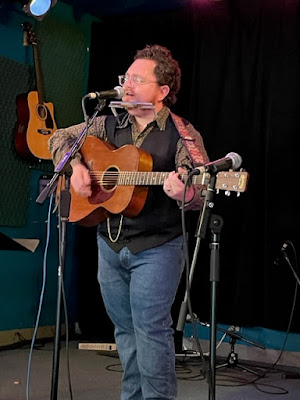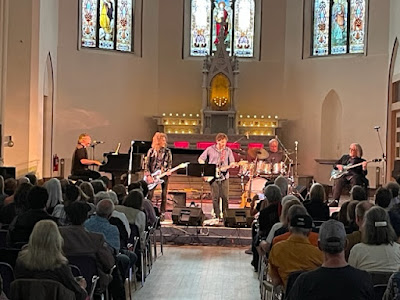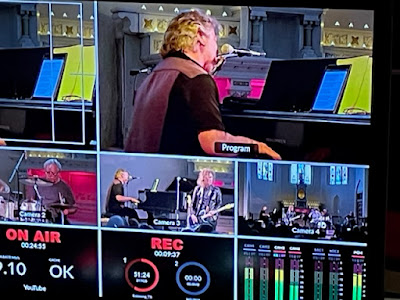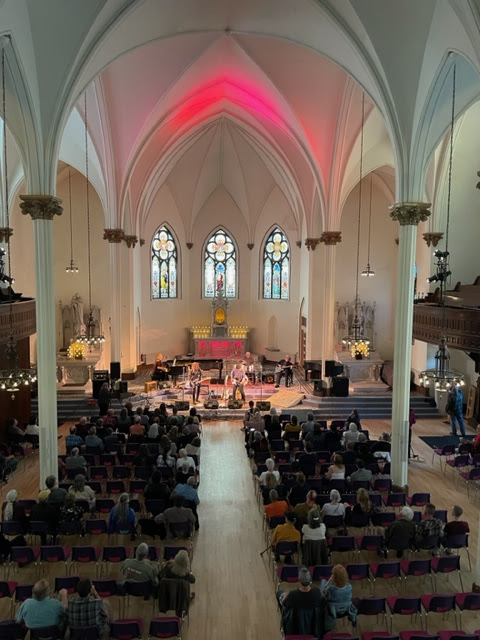 |
| Danny Fox stands and delivers. |
Not only did he expand our understanding of why and how Dylan has been so influential, Matt demonstrated in no uncertain terms how much Minnesota has been in Dylan's DNA and the values that formed the foundation of his career--and has never forgotten his roots.
Saturday evening a good crowd gathered once more at Sacred Heart to be swept away by The Infidels, a Minneapolis supergroup that put on one heckuva show. Here are some photos from Saturday's events followed by an interview with ChatGPT and Google Bard.
 |
| Danny Fox |
 |
| Matt Steichen hits a grand slam. |
 |
| Dan Israel and the Infidels |
EN: Why did many people in the 1960's consider Bob Dylan the "voice of his generation"?
 |
| The Infidels, Streaming Live |
- Protest and Social Consciousness: During the 1960s, there was significant social and political upheaval in the United States and around the world. Dylan's songs, such as "Blowin' in the Wind" and "The Times They Are a-Changin'," became anthems for the civil rights movement, anti-war movement, and other social justice causes. His lyrics addressed pressing issues like racial inequality, war, and the struggle for individual freedom, capturing the spirit of activism and resistance that defined the era.
- Authenticity and Emotional Depth: Dylan's music was characterized by its raw, honest, and deeply personal nature. His distinctive voice and passionate delivery conveyed a sense of authenticity and emotional depth that resonated with listeners. Many people felt that Dylan's songs reflected their own experiences, frustrations, and aspirations, making him a relatable figure and an embodiment of the struggles and dreams of the generation.
- Artistic Evolution and Cultural Influence: Dylan's music evolved throughout the 1960s, and he continually pushed the boundaries of folk music by incorporating elements of rock and other genres. His willingness to experiment and his ability to adapt his sound to reflect the changing times demonstrated his artistic growth and versatility. This evolution made him a cultural icon and influenced countless musicians who followed, shaping the direction of popular music.
- Intellectual and Poetic Lyrics: Dylan's lyrics were known for their poetic quality and intellectual depth. His ability to craft thought-provoking and introspective verses distinguished him from many other songwriters of the time. His lyrics often contained rich symbolism, vivid imagery, and social commentary, challenging listeners to engage with the messages and themes embedded in his songs.
Overall, Bob Dylan's unique blend of social consciousness, emotional depth, authenticity, artistic evolution, and poetic lyrics made him a significant voice for the generation of the 1960s. His music spoke directly to the hopes, frustrations, and aspirations of his audience, earning him the title of the "voice of his generation."
EN: Why did many people in the 1960's consider Bob Dylan the "voice of his generation"
 |
| Malibu Bob (See footnote*) |
Here are some of the reasons why many people in the 1960s considered Bob Dylan the "voice of his generation":
- His music was relatable: Dylan's music spoke to the experiences and emotions of young people in the 1960s. His songs about love, loss, and social injustice resonated with a generation that was coming of age during a time of great social and political upheaval.
- His lyrics were poetic and insightful: Dylan's lyrics were often poetic and insightful, and they offered a unique perspective on the world. His songs were not just about the here and now, but also about the past and the future.
- He was a cultural icon: Dylan was not just a musician, but also a cultural icon. He was known for his rebellious attitude and his willingness to challenge the status quo. He was a role model for young people who were looking for a way to express themselves and to make a difference in the world.
Dylan's music continues to be relevant today, and he is still considered one of the most important and influential musicians of all time. He is a true icon of the 1960s, and his music helped to shape the culture of that era.
 |
| Balcony shot: The Infidels @ Sacred Heart |
*There's always a bit of fun here that doesn't get captured. This is Karyn Wilder arrayed in Dylan attire. Karyn also helped close the week of events, performing at our goodbye brunch.










No comments:
Post a Comment